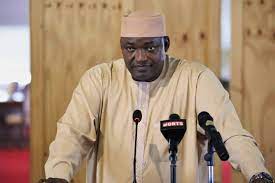Gambia’s president Adama Barrow has found himself at the wrong end of raw emotions from his compatriots on all sides of the political divide and beyond.
A shocking monologue by Mr. Barrow casting an apparent death wish on his political protege turned archrival Ousainou Darboe over the weekend has upped the political temperature by huge notches, drawing condemnation from all quarters of Gambian society.
While launching a new bureau for his ruling National People’s Party (NPP) in the town of Brikama on Saturday President Barrow spat fire on Mr Darboe, implying in his fiery monologue that it is almost a certainty that the 75-year-old lawyer will have to be dead and buried before he would relinquish power.
Barrow added a macabre caveat to this apparent death wish directed at Darboe by saying he will be alive to attend the opposition leader’s funeral and confirm his death before making way for his successor.
Barrow said: “I will take an oath today that I will remain as president until Ousainou Darboe dies. Until such time that he is dead, I will remain president. That is the contract I have signed. When his death is announced, and I attend his funeral, then I will be fulfilled as president, and I can step aside”.
President Barrow was a member of the UDP when he inflicted a shock election loss on his predecessor Yahya Jammeh and ascended the presidency in 2017, appointing party leader Darboe as foreign minister and later vice-president.
Barrow and his former political godfather would later become estranged, leading to Darboe’s removal from office in 2019.
A chorus of condemnation swiftly followed in the wake of Barrow’s nihilistic expression aimed at his former vice president, beginning with Darobe’s own UDP and followed by other politicians and non-politically inclined Gambians who dismissed it as dangerous hate speech which could aggravate political divisions and trigger conflict.
The UDP condemned in the strongest possible terms ”the unwarranted and distasteful vitriol” by President Barrow.
”These remarks are disgusting, irresponsible, and dangerous. Worse, it is hate speech and a threat to the life and well-being of Ousainou Darboe since the President spoke with much certainty” the statement said.
Meanwhile Mr. Darboe whose party said he is aware of the death wish on him urged his supporters to remain calm and reminded President Barrow of a collective responsibility as citizens, ”but more so as leaders, to appeal to the best versions of those we seek to lead. This responsibility is even greater on the President, in whom many have reposed trust to preside over the nation’s affairs”.
The UDP said President Adama Barrow has failed to be a unifying figure and urged the National Human Rights Commission to engage the president ”on this unstatesmanlike conduct”.
Other politicians like Essa Faal, the former lead counsel of the truth commission who stood against Barrow in the 2021 presidential election condemned his ‘incendiary’ statement.
A statement Mr Faal released on Sunday said: ”Such language has no place in our political discourse, and I stand with fellow Gambians in condemning this troubling statement. While political differences are natural, they must not lead to vile remarks especially from a head of state. It is crucial for leaders to uphold civility, respect, and decency, especially during times of political tension and economic challenges”.
He said The Gambia ”deserves leaders who prioritise unity and understanding over division”.
Writing on the issue, Demba Ali Jawo, a former information minister under Barrow criticised the president’s speech as beyond despicable and hitting the lowest point imaginable morally.
Ungracious, uncouth and the worst possible attitude in public was how other Gambians described the statement which they maintained has a tendency to divide people and aggravate emotions to dangerous levels.
However, Barrow’s NPP scribes sprang to his defensive arguing that the president’s remarks should not be taken literally.
Sulayman Camara, NPP’s Media and Communication Secretary, said Barrow’s speech had meant that “the opposition leader up to his grave shall never be a president of this country,”.
He claimed that the interpretation of the statement as a threat towards the opposition leader ”is not only incorrect but also misleading”.
He said President Barrow’s statement was to ”underscore his confidence in the current administration’s policies and the belief in continued public support. Such expressions are often used to convey determination and conviction in political discourse, rather than literal intentions or threats”.
WN/as/APA


